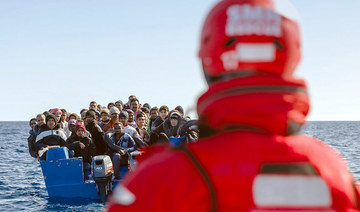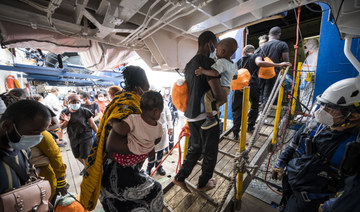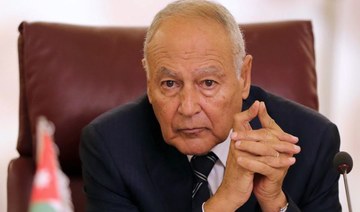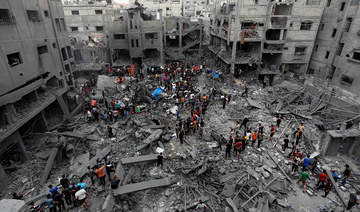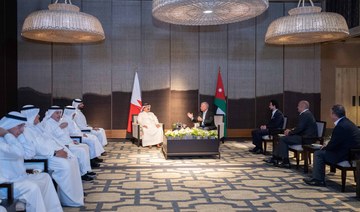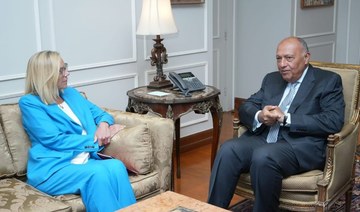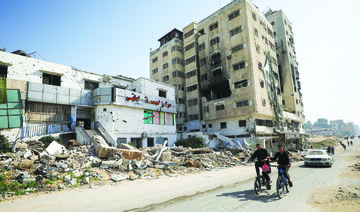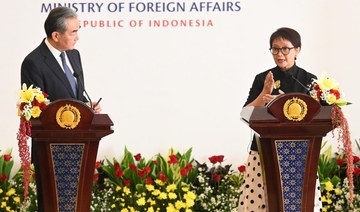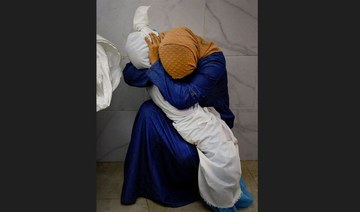RABAT: Moroccan coast guards have assisted more than 300 migrants in difficulty aboard various craft since Friday, the official MAP news agency reported on Monday.
Most of the 331 were from sub-Saharan Africa, the agency said, citing a military source.
Despite stepped-up controls, migrant departures from Morocco’s coasts have increased lately.
Mainland Spain is only about 20 kilometers (12 miles) from Morocco.
Further south along the Moroccan-controlled coast of the disputed Western Sahara, the migrants’ goal is normally Spain’s Canary Islands.
The passengers received first aid aboard navy units “before being taken to the nearest ports, then handed over to police for the usual administrative procedures,” the source quoted by MAP said.
On Monday, two migrants were found dead among about 40 on a drifting boat off Gran Canaria island, Spain’s coast guard told AFP.
On Friday, officials and relatives said four Moroccan migrants drowned in the Atlantic Ocean while trying to reach the European Union.
Between January and October a total of 32,713 migrants arrived in Spain by sea, an increase of more than 24 percent compared with the same period a year earlier, Spanish interior ministry figures showed.
To the end of September there have been 1,025 deaths on the route to Spain, making this year the deadliest, according to the International Organization for Migration.
Other North African countries, Tunisia and Libya, are also major migrant departure points to Europe.
Morocco says hundreds of migrants assisted off coast
https://arab.news/bdjdf
Morocco says hundreds of migrants assisted off coast
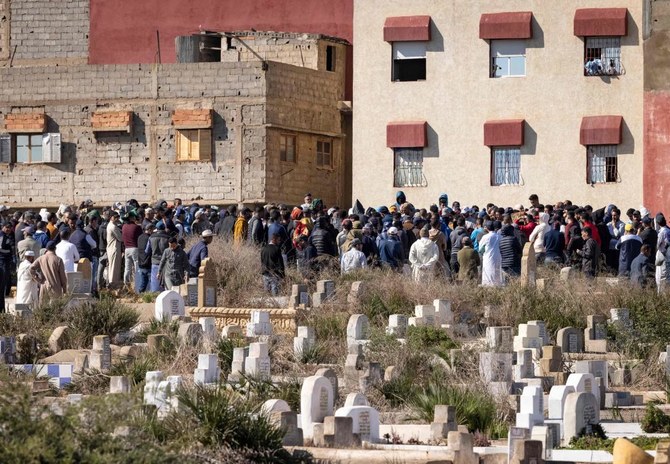
- Most of the 331 were from sub-Saharan Africa, the agency said, citing a military source
- Despite stepped-up controls, migrant departures from Morocco's coasts have increased lately
Dubai clears up after epic rains swamp glitzy desert city
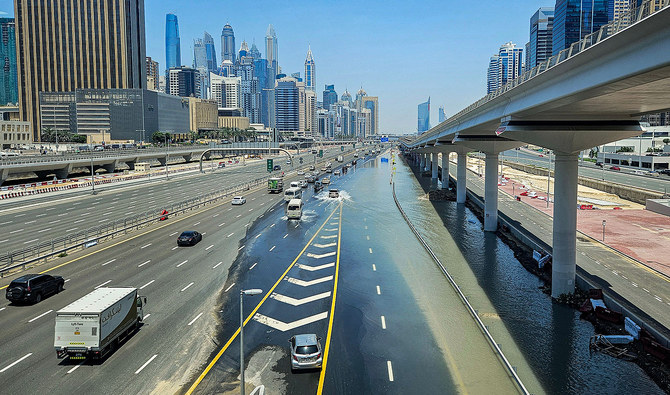
- Rains were the heaviest experienced by the United Arab Emirates in the 75 years that records have been kept
- Flooding trapped residents in traffic, offices and homes, houses’ roofs leaked and malls were overrun with water
DUBAI: Dubai, a city in the desert proud of its futuristic gloss, was on Thursday busy clearing its waterclogged roads and drying out flooded homes two days after a record storm saw a year’s rain fall in a day.
Dubai International Airport, a major travel hub, struggled to clear a backlog of flights and many roads were still flooded in the aftermath of Tuesday’s deluge.
The rains were the heaviest experienced by the United Arab Emirates in the 75 years that records have been kept. They brought much of the country to a standstill and caused significant damage.
Flooding trapped residents in traffic, offices and homes. Many reported leaks at their homes, while footage circulated on social media showed malls overrun with water pouring from roofs.
Traffic remained heavily disrupted. A highway through Dubai was reduced to a single lane in one direction, while the main road that connects Dubai with the capital Abu Dhabi was closed in the Abu Dhabi direction.
“This was like nothing else. It was like an alien invasion,” Jonathan Richards, a Dubai resident from Britain told Reuters.
“I woke up the other morning to people in kayaks with pet dogs, pet cats, suitcases all outside my house.”
Another resident, Rinku Makhecha, said the rain swamped her freshly renovated house she moved into two weeks ago.
“My entire living room is just like ... all my furniture is floating right now,” she said.
In Dubai’s streets, some vehicles, including buses, could be seen almost entirely submerged in water. Long queues formed at petrol stations.
Dubai airport had yet to resume normal operation after the storm flooded taxiways, forcing flight diversions, delays and cancelations.
Dubai Airports Chief Operating Officer Majed Al Joker told Al Arabiya TV he expected Dubai International Airport to reach 60-70 percent capacity by the end of Thursday and full operational capacity within 24 hours.
The airport struggled to get food to stranded passengers with nearby roads flooded and overcrowding limited access to those who had confirmed bookings.
RETURNING SUPPLIES
The storm, which hit neighboring Oman on Sunday, pounded the UAE on Tuesday, with 20 reported dead in Oman and one in the UAE.
While some roadways into hard-hit communities remain flooded, delivery services across Dubai, whose residents are used to ordering everything at the click of a mouse, slowly began returning to the streets.
Rains are rare in the UAE and elsewhere on the Arabian Peninsula, which is typically known for its dry desert climate. Summer air temperatures can soar above 50 degrees Celsius.
Following Tuesday’s events, questions were raised whether cloud seeding, a process that the UAE frequently conducts, could have caused the heavy rains.
But climate experts blame global warming for such extreme weather events.
Researchers anticipate that climate change will lead to heightened temperatures, increased humidity and a greater risk of flooding in parts of the Gulf region. Countries like the UAE where there is a lack of drainage infrastructure to cope with heavy rains can suffer the most.
A UAE government agency that oversees cloud seeding — a process of manipulating clouds to increase rainfall — denied conducting any such operations before the storm.
President Sheikh Mohammed bin Zayed Al Nahyan said in a statement he had ordered authorities to assess the damage and provide support to families impacted by the storm.
Dubai’s Crown Prince Sheikh Hamdan bin Rashid Al Maktoum said on X that the safety of citizens, residents and visitors was the utmost priority.
“At a meeting with government officials in Dubai, we set directives to prepare comprehensive plans in response to natural crises’ such as the unexpected current weather conditions,” he said.
Arab League chief voices Gaza fears in talks with UN official
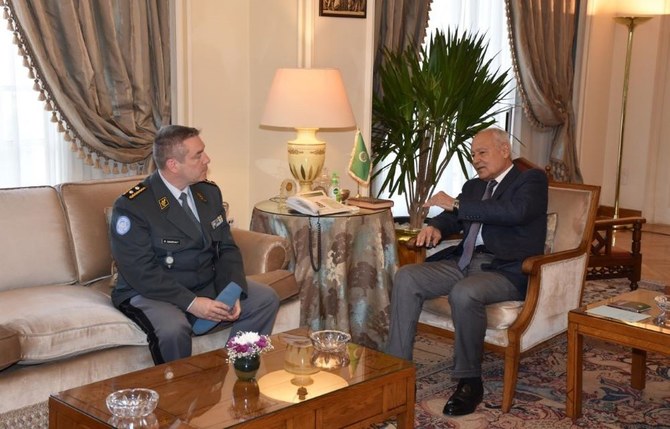
- Secretary-General Ahmed Aboul Gheit met with the UN’s Maj. Gen. Patrick Gauchat
- UNTSO chief briefed the secretary-general on conflicts in several areas monitored by the UN
CAIRO: Arab League Secretary-General Ahmed Aboul Gheit has told a senior UN official that he fears the conflict in Gaza could spiral out control and threaten regional security.
In a meeting in Cairo with Maj. Gen. Patrick Gauchat, head of mission and chief of staff of the UN Truce Supervision Organization, Aboul Gheit highlighted the need to implement the UN Security Council’s ceasefire resolution, and provide urgent humanitarian aid to the famine-stricken population in Gaza.
Gamal Roshdy, a spokesperson for the Arab League chief, said that the meeting discussed the regional situation, with Aboul Gheit saying that Israel’s war on Gaza violated international law and humanitarian principles.
The UNTSO chief briefed the secretary-general on conflicts in several areas monitored by the UN, including the Blue Line, which delineates the truce between Lebanon and Israel.
Aboul Gheit said that political resolutions remain the most effective means to ensure security for all parties.
However, achieving such resolutions remains challenging while Israel pursue its objectives through military force and by targeting civilians, he said.
According to the UNTSO website, the Security Council, in Resolution 50 (1948), called for a cessation of hostilities in Palestine on May 29, 1948, and decided that the UN Mediator should supervise the truce with the assistance of a group of military observers.
The first group of military observers, established in 1949 to supervise the implementation of the Israel-Arab Armistice Agreements, became known as the UN Truce Supervision Organization.
UNTSO observers in the Middle East to monitor ceasefires, supervise armistice agreements, prevent isolated incidents from escalating, and assist other UN peacekeeping operations in the region.
King of Bahrain, Egyptian president highlight need for unified Arab response to Gaza crisis
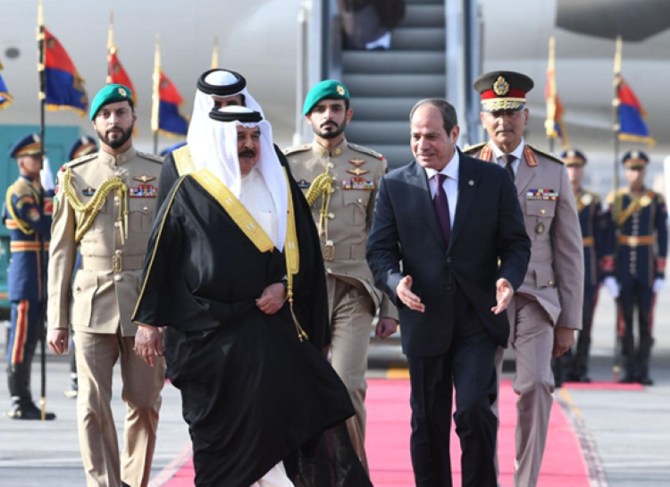
- Abdel Fattah El-Sisi and King Hamad pledge joint action to address the escalating crisis in Gaza
- King Hamad and El-Sisi also discussed the agenda for the 33rd Arab Summit, which Bahrain will host next month
CAIRO: Egyptian President Abdel Fattah El-Sisi and King Hamad of Bahrain have pledged joint action to address the escalating crisis in Gaza and its effects on the region.
El-Sisi received King Hamad in Cairo on Wednesday, where the leaders expressed hope that peace efforts would lead to a new path for the region, offering a future in which they work together toward prosperity.
King Hamad told a joint press conference that the president and he also discussed the agenda for the 33rd Arab Summit, which Bahrain will host next month.
The leaders emphasized the need for clear policies to promote peace, security and stability in the Middle East.
The king said he discussed several issues with El-Sisi to enhance Arab cooperation.
El-Sisi said he and King Hamad deliberated “on our countries’ efforts and joint Arab action to address this untenable situation, bring it to an end, and, above all, prevent its recurrence.”
The Egyptian leader added: “For this to happen, the international community shall stand united to enforce an immediate, urgent, and lasting ceasefire in the Gaza Strip, end any attempts of coerced displacement, starvation, or collective punishment of the brotherly Palestinian people, and ensure the full-fledged, unfettered and sustainable flow of sufficient quantities of desperately needed humanitarian aid and relief to the sector.
“In parallel, the parties shall immediately embark, in earnest, on tracks conducive to a just and enduring political solution to the Palestinian cause, based on the two-state solution and the establishment of an independent, sovereign Palestinian state, along the June 4, 1967 borders, with East Jerusalem as its capital, enjoying both international acknowledgment and full membership of the UN.”
El-Sisi said Egypt had repeatedly warned of the dire consequences likely to result from the ongoing war in occupied Palestine, where the conflict leads to calls for escalation and retribution, creating a cycle of violence that destroys any chance for peace and stability in the region.
“Indeed, over the past few months, the region has been experiencing the devastating consequences of the ongoing war as its flames spiraled outward, creating the current intensely fraught and perilous state in the region that gravely jeopardizes the security, stability, and future of our people,” he added.
El-Sisi said that the leaders “thoroughly discussed these troubling regional developments and our visions for addressing them, driven by our shared belief in the crucial importance of safeguarding the security and stability of the region and its peoples against multiple threats and of not abandoning their fate to the will of warmongers. This commitment is grounded in the principle of prioritizing common Arab security, which we consider as indivisible.”
El-Sisi said that the two leaders agreed on the need to exert and encourage immediate and intensive efforts toward de-escalation in the Palestinian territories and at regional level.
“We also discussed the importance of urging the parties to adopt a rational approach, embrace political solutions, and abandon military solutions and notions of dominance and hegemony,” the president said.
El-Sisi said: “Today, we are gathering at a time of great peril as a result of the bloody Israeli war on the Gaza Strip and the inexorable loss of thousands of helpless and innocent civilians in scenes of untold horror.
“They have done nothing more than live in their land, clinging to their homes and homeland, and yearning for a life with dignity, pride, and humanity.
“It is unequivocally a watershed moment that will endure in the annals of history, given the outrageous use of military force to terrorize, starve, and inflict unimaginable suffering on innocent civilians, collectively and indiscriminately, to terrify them into abandoning their homes and forcibly displace them from their land.
“All this unfolds while the international community stands by idly, with its ability or will to uphold justice and enforce international law, international humanitarian law, or even the basic tenets of humanity, utterly crippled,” El-Sisi said.
US, UK unveil sweeping sanctions on Iran’s drone program
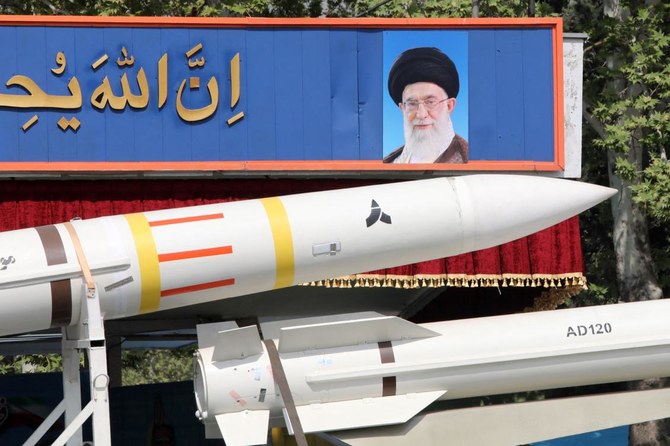
- Treasury’s Office of Foreign Assets Control targeted 16 people and two entities in Iran that produce engines that power the drones used in the April 13 attack on Israel
- UK is targeting several Iranian military organizations, individuals and entities involved in Iran’s drone and ballistic missile industries
WASHINGTON: The United States and the United Kingdom announced widespread sanctions against Iran’s military drone program on Thursday in response to its weekend attack against Israel.
Washington is targeting “16 individuals and two entities enabling Iran’s UAV production, including engine types that power Iran’s Shahed variant UAVs, which were used in the April 13 attack,” the Treasury Department said in a statement, referring to Iran’s unmanned aerial vehicle program.
The United Kingdom is also imposing sanctions “targeting several Iranian military organizations, individuals and entities involved in Iran’s UAV and ballistic missile industries,” the Treasury Department said.
Tehran launched its first ever direct military attack on Israel late Saturday in retaliation for an April 1 air strike on the Iranian consulate in Damascus — widely blamed on Israel — that killed seven members of the Islamic Revolutionary Guard Corps, including two generals.
The large-scale attack involved more than 300 drones and missiles, most of which were shot down by Israel and its allies including the US and the UK, causing little damage.
In response to the attacks, Israel’s prime minister, Benjamin Netanyahu, said Israel reserves the right to protect itself.
“Today, in coordination with the United Kingdom and in consultation with partners and allies, we are taking swift and decisive action to respond to Iran’s unprecedented attack on Israel,” US Treasury Secretary Janet Yellen said in a statement.
“We’re using Treasury’s economic tools to degrade and disrupt key aspects of Iran’s malign activity, including its UAV program and the revenue the regime generates to support its terrorism,” she continued.
“We will continue to deploy our sanctions authority to counter Iran with further actions in the days and weeks ahead,” she added.
Alongside its sanctions against Iran’s UAV program, the US is also sanctioning five companies providing parts for Iran’s steel industry.
“Iran’s metals sector generates the equivalent of several billion dollars in revenue annually, with the majority coming from steel exports,” the Treasury Department said, adding it had also sanctioned an automaker involved in providing “material support” to Iran’s Islamic Revolutionary Guard Corps.
Israel bombs Gaza as Middle East tense after Iranian attack
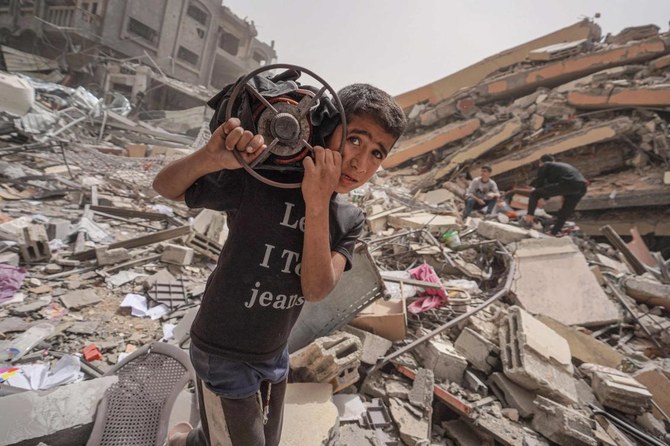
- “We are on the edge of a war in the Middle East which will be sending shock-waves to the rest of the world,” EU foreign policy chief Josep Borrell said
- Iran has warned of “a fierce and severe response” if Israel launches any further attacks after seven of its Revolutionary Guards died in the consular strike
JERUSALEM: Israel launched more deadly strikes on besieged Gaza on Thursday as world powers watched nervously whether the country would retaliate against a weekend attack by its arch enemy Iran.
The Israeli army said it had bombed dozens of targets in the Palestinian coastal territory of 2.4 million people, more than six months into the bloodiest ever Gaza war.
Weeks of talks toward an Israel-Hamas truce and hostage release deal have stalled, according to Qatar’s prime minister who said the Gulf emirate was now “reassessing our role as mediator.”
Israeli Prime Minister Benjamin Netanyahu, who has vowed to destroy Hamas over its October 7 attack on Israel, also stressed on Wednesday that Israel “reserves the right to protect itself” against Iran.
The Islamic republic last weekend carried out its first ever attack to directly target its regional foe but Israel, backed by its allies, intercepted most of the 300 missiles and drones and suffered no deaths.
Iran’s attack was retaliation for an April 1 air strike, which it blamed on Israel, on the consular annex of its embassy in Damascus.
The international community has urged de-escalation since Iran’s attack on Israel which came after months of high tensions and violence involving Israel and Iran-backed groups in Lebanon, Iraq, Syria and Yemen.
“We are on the edge of a war in the Middle East which will be sending shock-waves to the rest of the world,” EU foreign policy chief Josep Borrell said ahead of a G7 meeting in Capri, Italy.
Iran has warned of “a fierce and severe response” if Israel launches any further attacks after seven of its Revolutionary Guards died in the consular strike.
However, Tehran had also sought to calm tensions through indirect diplomatic channels with its other major adversary, the United States, which is Israel’s top ally and military supplier.
Foreign Minister Hossein Amir-Abdollahian, in New York for a UN meeting, said Iran had “tried to tell the United States clearly” that it is “not looking for the expansion of tension in the region.”
Washington has made clear it won’t join any Israeli attack on Iran, but has pledged to instead impose new punitive sanctions against Iran.
The European Union on Wednesday said it would impose new sanctions on Iran’s drone and missile producers.
Israeli public broadcaster Kan said Netanyahu, after discussions with US President Joe Biden, decided not to proceed with pre-arranged plans for retaliatory strikes on Iran.
“Diplomatic sensitivities came into play,” a senior Israeli official told Kan, speaking on condition of anonymity.
The official added that there would be a response, but that it would be different to the one initially planned.
US broadcaster ABC News, citing three unnamed Israeli sources, reported that Israel had “prepared for and then aborted retaliatory strikes against Iran on at least two nights this past week.”
Among the range of possible responses considered by Israel were an attack on Iranian proxies in the region or a cyberattack, the sources told ABC.
German airline Lufthansa extended its suspension of flights to and from Tehran and Beirut to the end of April and said its planes would continue avoiding Iranian airspace.
Israel’s Foreign Minister Israel Katz welcomed a European Union announcement of sanctions on Iran as “an important step” and wrote on X that “Iran must be stopped now before it is too late.”
Iran’s attack on Israel “is succeeding in taking the focus, particularly the media spotlight, off of the Gaza famine and the Gaza war and the loss of life that is taking place there,” Roxane Farmanfarmaian, a Middle East/North Africa specialist at the University of Cambridge’s POLIS department, told AFP.
“And that was very much I think what Israel planned to do,” she said.
An AFP correspondent in Gaza said Israeli artillery shelling and aircraft strikes again hit Gaza City overnight.
The Israeli military said it struck dozens of militant targets over the past day.
The war started after Hamas launched their unprecedented attack on October 7 that resulted in the deaths of 1,170 people in southern Israel, mostly civilians, according to an AFP tally based on Israeli official figures.
The militants also took about 250 hostages. Israel estimates 129 remain in Gaza, including 34 who are presumed dead.
Israel’s retaliatory offensive has killed at least 33,970 people in Gaza, mostly women and children, according to the latest toll on Thursday from the health ministry in the Hamas-run territory.
Gaza’s civil defense said Thursday it had recovered 11 more bodies in the southern city of Khan Yunis during the night.
Israel had also bombed the far-southern city of Rafah.
Gaza rescue crews recovered the corpses of eight family members, including five children and two women, from a house in Rafah’s Al-Salam neighborhood, the civil defense service said.
One woman in Rafah, Jamalat Ramidan, told AFP she and crying children fled the carnage of a strike, stumbling over “body parts and corpses scattered all over the place.”
Talks toward a ceasefire have stalled, said Qatari Prime Minister Sheikh Mohammed bin Abdulrahman Al-Thani, despite months of effort also involving United States and Egyptian officials.
He said his country was undertaking “a complete re-evaluation of its role because there has been damage to Qatar,” which does not have diplomatic relations with Israel.
Israel has faced growing global opposition to the Gaza war, which the United Nations and aid agencies say has left the north of the territory on the brink of famine.
Netanyahu on Wednesday rejected this, saying Israeli efforts were “above and beyond” what is needed “on the humanitarian issue,” his office said.
The UN Security Council was preparing to vote soon on an Algeria-drafted resolution for full United Nations membership for a Palestinian state, diplomatic sources said.
However, the veto-wielding United States has repeatedly expressed opposition to such a move.



